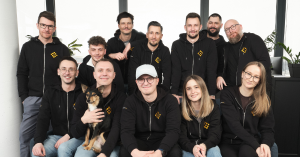Shaping the ecosystem efforts and initiatives towards AI innovation with the CEE AI Report 2023, The Recursive sat down with Radovan Kavický, AI & Data Science Evangelist within AIslovakIA, a national platform for AI development in Slovakia, founder of PyData Slovakia and President at GapData Institute to discuss the collaboration, challenges, and opportunities of the evolving regional AI landscape. Furthermore, Radovan also comments on the AI legislation, regulations, and the region’s path toward responsible AI innovation, emphasizing the importance of synchronized efforts between academia and industry.
With an academic background in Finance and later on moving to a Ph.D. in the area of Explainable AI (xAI), Radovan was also selected as the first person from the CEE region to become a lecturer at DataCamp, one of the most successful startups in AI and Data Science education. He also worked as an Advisor for the Prime Minister of the Slovak government, Iveta Radičová, and an Analyst at MESA 10, where he participated in numerous nationwide reforms. From 2019, he is also part of an initiative to connect all the essential AI industry players in Slovakia, including business, academia, and government, which afterward transformed into the current organization, AIslovakIA (formerly named Slovak.AI).
In the beginning, AIslovakIA organized various events and conferences to connect the CEE region globally, which they continue holding until today. Moreover, within their strategy and one of their main initiatives, AI-Clinic, they identified healthcare as one of the areas with the greatest potential for applied AI. Another area of their cooperation is policymaking. AIslovakIA works with one of the ministries (MIRRI, within the Slovak government) that has the agenda of digitalization and informatization, including AI.
The following interview was conducted as a part of The Recursive’s “State of AI in CEE” report. Download the full report with insights from 40+ experts and an analysis of 900 AI product companies from CEE.
The Recursive: How do you view the government’s involvement in Slovakia regarding AI initiatives?
Radovan Kavický: So far, several branches of Slovak government/ministries are open to cooperation. However, we are mostly working with one ministry (MIRRI/Slovak Ministry for Investments, Regional Development and Informatization) within the agenda of digitalization, so the reality is that artificial intelligence is not a separate objective of the Slovak government yet, but hopefully, by small steps, we are getting there.
There is still a lot of room for improvement, for example, in the support of innovative businesses. Within Slovakia, there is still no functional way to support these projects. We also have a lot of brain drain (including AI) to other countries, like Czechia, Germany, UAE, Japan, and others. The main problem is that many talented Slovaks (successful also within the AI area) live abroad. I see great potential in setting the right environment for the experts so they can come back, bring innovation, and improve our industry, which is one of our goals. The conditions right now are not optimal, which is one of the reasons why a lot of Slovak AI talent is currently abroad, but I believe we will reach this untapped potential in the upcoming years.
How do you perceive the current state of collaboration and partnerships among various stakeholders to strengthen the AI ecosystem in Slovakia and the CEE region?
“In the optimal collaboration structure, I see the government as the main player in this area. First, we need to identify the simple fact that artificial intelligence presents a high level of importance and is a main factor for future economic growth. The government should also set rules for support and actively participate in creating the environment. Then, within the environment, the most important are people – the AI talent. Even with the brain drain, we still have enough talented people within the region, but we need to optimize the ecosystem to be able to compete with other regions.”
The future will be as we will set it. In my opinion, intense cooperation between all the ecosystem players is the key to success and staying competitive globally. If we implement it right, we will be among the winners.
How do you assess the availability and quality of AI talent in Slovakia? From your perspective, what are the most crucial AI specializations and skills in the region?
Radovan Kavický: I’m studying Artificial Intelligence (Ph.D. in Košice/TUKE), which currently, in my opinion, offers the best program in AI within Slovakia. Another important AI and software engineering hub is in Bratislava at the Faculty of Informatics at Bratislava Technical University. Compared to other regions, I think there is still a large gap between the regional and Western universities. However, even Western universities have problems and issues within their AI and Data Science programs.
To be more concrete and explain further, for example, I have experience from DataCamp, which is a global leader in AI and Data Science education. We are working there on the global curriculum within AI and Data science, and the development within AI and speed of innovation within Data Science is so high that even the best Western (within both the US and Europe) universities are not able to keep up and become our clients. We are helping them implement new technologies (e.g., Generative AI) and trends in their curriculum. What is missing both globally and locally is cooperation between the top businesses and top academics.
In the past, academia was historically the main driver of innovation in AI. We are currently in a situation where the best research is done within companies and their research branches, which is a paradox (that academia cannot keep up/the main problem is money, and governments globally are not supporting AI research enough).
“In the future, we need to find a way to connect the AI innovation currently happening in companies to keep up with the top universities and research within countries. We need both areas to be on the highest level. The AI programs within the Western nations are mostly successful because they are able to combine these two worlds.”
How would you imagine this cooperation to work?
Radovan Kavický: I think the best ones, human capital in AI, who are doing the best research, should also teach the next generation of innovators who will work on future AI breakthroughs, not only teach the students theory. Within the last decade, we identified that the innovation process is shortening. In the past, the innovation cycle was like two years. Currently, it’s about a few months, and academia is working in a different, longer cycle. So, we need to synchronize those two, and academia and governments must speed up.
If academia can adapt to these changes in the future and the same innovators will be active in both the academic and business worlds, we will be successful. I think this is how to prepare for the new wave of innovation, including AI.
What is your perspective on the evolution of the AI startup landscape in Slovakia and the broader CEE region?
Radovan Kavický: Some Slovak AI startup players were very successful in the past, but many of them were sold to other, larger, and global companies. So, the current position is that we don’t have as many successful AI startups as other countries. Moreover, several Slovak AI startup founders decided to set up their businesses abroad, e.g., in the Baltic countries, the Czech Republic, the US, or Germany, due to more favorable conditions there.
What unique challenges or limitations does Slovakia face compared to other CEE countries or regions like Western Europe and the US?
Radovan Kavický: Within the CEE region, the countries face similar problems, including brain drain, as other ecosystems, such as Germany, are more successful in hiring AI talent. On the other hand, one of the CEE countries where the brain drain isn’t as significant is Poland, where we see an “inverse brain drain” as talent returns to the region. So, something within CEE is changing.
Another issue is the quality of universities within AI, which still needs to be developed. In Slovakia, we have three main hubs with the potential to educate future leaders in the industry — Košice, Bratislava, and Žilina. Moreover, many talented students and teachers decide to leave for the UK or the US, so there is a notable brain drain on the university level, too. Within Central and Eastern Europe, we are simply not able to compete for wages or opportunities. While our region has many talented professionals, we are not yet viewed globally as the hub of the best AI talent. It needs work to change this view.
What is your perspective on the latest AI legislation developments, and how are AI regulations impacting the ecosystem in Slovakia and the broader CEE region?
Radovan Kavický: Looking at the AI industry from a global perspective, the biggest innovations are currently happening in the US, for example, in the case of Open AI’s ChatGPT or China, where various restrictions such as GDPR are not happening. In Europe, we are bound by these rules and the upcoming AI Act. The philosophy is to develop a different kind of AI and startup setting in an ethical way. While it has benefits, it also puts us at a disadvantage in terms of innovation opportunities.
I’m not saying we should change our approach in Europe; however, we should try to push the speed as we will not stay competitive in the long term. Otherwise, the loss of competitiveness will make our efforts in AI industry integrations obsolete.
Could you elaborate on the process of formulating a responsible AI strategy and how you assess Slovakia’s progress in this direction?
Radovan Kavický: There are developments towards this in Slovakia. For example, my organization, GapData Institute, and AIslovakIA, as a national platform, are part of a network within the EU promoting trustworthy AI. Other regional players are within this network, including Czechia, Poland, and Hungary. Another initiative is from businesses by, for example, Microsoft in Czechia and Slovakia for responsible AI.







